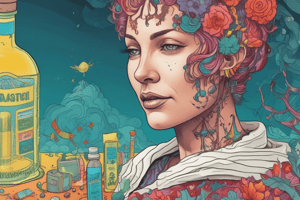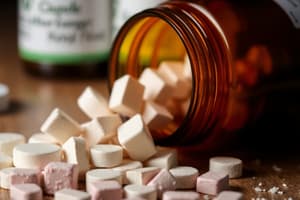Podcast
Questions and Answers
What is a psychoactive drug?
What is a psychoactive drug?
- A natural pesticide
- A chemical that changes our states of consciousness and perceptions (correct)
- A type of stimulant
- A type of depressant
Which of the following are the four primary classes of psychoactive drugs?
Which of the following are the four primary classes of psychoactive drugs?
- Opioids (correct)
- Stimulants (correct)
- Depressants (correct)
- Hallucinogens (correct)
What is tolerance?
What is tolerance?
An increase in the dose required to produce the same effect.
What does dependence mean in relation to drug use?
What does dependence mean in relation to drug use?
What is withdrawal?
What is withdrawal?
What is the safety ratio?
What is the safety ratio?
What are sleeping pills prescribed for?
What are sleeping pills prescribed for?
What are benzodiazepines prescribed for?
What are benzodiazepines prescribed for?
What is addiction?
What is addiction?
What is a stimulant?
What is a stimulant?
What is caffeine?
What is caffeine?
What is nicotine?
What is nicotine?
What is cocaine?
What is cocaine?
What is amphetamine?
What is amphetamine?
What is a depressant?
What is a depressant?
What is alcohol?
What is alcohol?
What are barbiturates?
What are barbiturates?
Can you name some brand name barbiturates?
Can you name some brand name barbiturates?
What is a common use of benzodiazepines?
What is a common use of benzodiazepines?
Can you name some brand names of benzodiazepines?
Can you name some brand names of benzodiazepines?
What are toxic inhalants?
What are toxic inhalants?
What are opioids?
What are opioids?
What are common symptoms of opioid withdrawal?
What are common symptoms of opioid withdrawal?
What is opium?
What is opium?
What are morphine and heroin?
What are morphine and heroin?
What is codeine?
What is codeine?
What are hallucinogens?
What are hallucinogens?
What is cannabis (marijuana)?
What is cannabis (marijuana)?
What is LSD?
What is LSD?
What is psilocybin?
What is psilocybin?
Can you name some brand names of amphetamines?
Can you name some brand names of amphetamines?
Flashcards are hidden until you start studying
Study Notes
Psychoactive Drugs Overview
- Psychoactive drugs are chemicals that alter states of consciousness, perceptions, and moods.
- Four primary classes include stimulants, depressants, opioids, and hallucinogens.
Key Concepts
- Tolerance: This is the increased dosage needed to achieve the same psychoactive effects.
- Dependence: A condition where an individual feels the need to use a substance regularly.
- Withdrawal: Negative physical and psychological symptoms experienced when reducing or stopping drug use.
Safety and Usage
- Safety Ratio: Calculated as the potentially fatal dose divided by the normal effective dose.
- Sleeping Pills: Prescribed medications intended to induce drowsiness for sleep.
- Benzodiazepines: These are prescribed for relaxation and treating anxiety, insomnia, and muscle spasms.
Addiction
- Addiction is characterized by a strong craving for the drug, leading to compulsive seeking despite negative consequences.
Stimulants
- Stimulants enhance alertness by blocking reuptake of neurotransmitters like dopamine and norepinephrine.
- Caffeine: A bitter stimulant found in various plants.
- Nicotine: A stimulant from the nightshade family, acting as a natural pesticide.
- Cocaine: An addictive stimulant derived from coca plant leaves.
- Amphetamine: Increases wakefulness, focus, and decreases appetite and fatigue.
- Brand names include Adderall, Benzedrine, Dexedrine, and Vyvanse.
Depressants
- Depressants reduce CNS activity, leading to relaxation and drowsiness.
- Alcohol: A widely used depressant made from fermented sugar or starch.
- Barbiturates: Commonly prescribed as sleeping aids and painkillers; examples include Luminal and Seconal.
Opioids
- Opioids interact with opioid receptors in the brain to produce euphoria, pain relief, and other effects.
- Withdrawal symptoms can include diarrhea, insomnia, restlessness, irritability, and vomiting.
- Opium: The dried sap from the opium poppy, from which many opioids are derived.
- Stronger opioids include morphine and heroin, while codeine is a weaker and less addictive variant.
Hallucinogens
- Hallucinogens alter sensory perceptions and can cause hallucinations.
- Cannabis (Marijuana): The most commonly used hallucinogen for recreational and medicinal use.
- LSD: A potent psychedelic known for significant alterations in thought processes and sensory experiences.
- Psilocybin: A naturally occurring psychedelic compound found in certain mushrooms.
Studying That Suits You
Use AI to generate personalized quizzes and flashcards to suit your learning preferences.




